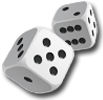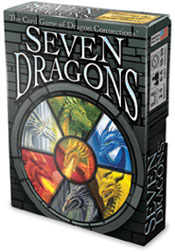



play board games
Board game reviews, strategy tips & session reports
Seven Dragons Review
 Stats:
Stats:
No. of players: 2-5
Amount of time to play: 10-30 minutes
Age requirements: 6+
Set-up time: 5 minutes
Seven Dragons Rules Description:
Seven Dragons is a light, fast-playing card game. If you can connect seven dragons in the color of your goal you win.
To begin Seven Dragons each player receives one goal. Your goal will be the color of dragons you are trying to chain together. The dragon colors are black, blue, gold, green and red. You also start with a hand of three cards. The silver dragon is placed in the center of the table
On your turn you draw a card and place a dragon card or play an action. Dragon cards must be placed next to at least one matching dragon. The cards must keep the same orientation and align with all other cards (creating a grid). The silver dragon begins the game as all colors at once.
If you place a dragon card with 2, 3 or 4 panels and match more than one dragon you may immediately draw a bonus card. Matching 3 dragons gets you 2 bonus cards and if you can match all four dragons you take 3 bonus cards.
There are five different action cards: Trade Hands, Move a Card, Rotate Goals, Trade Goals and Zap a Card. Each of these also corresponds to one of the colored dragons. When playing an action card there are three ways of doing so. You may take the action and change the color of the silver dragon to the color of the action you played. You may also simply take the action and not change the color of the silver dragon. Lastly you may change the color of the silver dragon and not take the action.
The actions are pretty self explanatory but Zap a Card. This allows you to take a card from the board and put it into your hand. The other actions pretty much do what they say.
If at any point you have seven connecting dragons in your goal color, you win!
A Quick Review of Seven Dragons:
Seven Dragons is a good filler and can start or finish off game nights well. It plays quick and even allows players to jump in part way through the game.
The art is good and the dragons look great. Seven Dragons is fairly chaotic and in a five-player game you could have different goals in your hand between turns. The options for changing the silver dragon’s color can really help (or hurt) you. And you should probably bluff a bit to win this one.
Seven Dragons plays well with kids. It even includes rules for 3-5 year olds. Seven Dragons is a game for all ages and most everyone should enjoy it.
Score and synopsis: (Click here for an explanation of these review categories.)
Strategy 2 out of 6
Luck 4 out of 6
Player Interaction 4 out of 6
Replay Value 3 out of 6
Complexity 2 out of 6
Fun 3 out of 6
Overall 3 out of 6

Leave a Reply